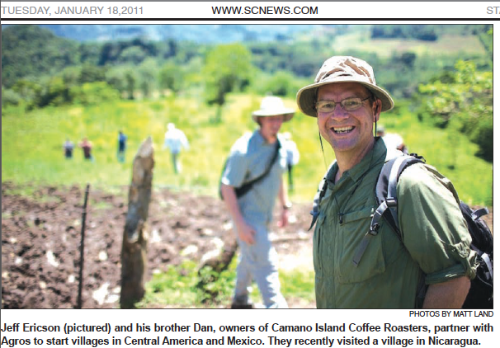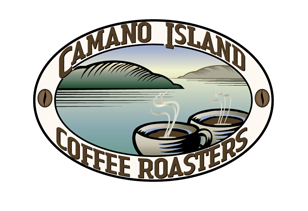It all starts with the dirt – By Jeremiah O’Hagan

This last week, an article was written about Jeff, Dan and their heart behind our company and why we supply only ethical coffee.
Other than the fact that they are uncle and nephew, not brothers, and few other small things, it was exciting to get some exposure in the local paper.
I’ve copied the entire article below; take a look and spread the word. The more eyes we get on this stuff, and the more people we can get involved, the more we can do to continue our work helping the poor get themselves out of poverty.
-Matt

By Jeremah O’Hagan
Staff Reporter
Jeff and Dan Ericson, owners of Camano Island Coffee Roasters (CICR), would like to dispel a rumor.
“We’re not in the coffee business,” Jeff said.
Surprising, coming from men who oversee daily roasting, packaging and shipping of coffee. Men who tout the “Coffee Lover’s Club’s” certified organic, fairly traded, shade-grown, sustainable coffee — the top 1 percent of all beans produced throughout the world.
“We’re in the fuel business,” Jeff added.
“(Our partner) Agros is a machine,” he explained. “It needs fuel. We’re selling fuel.”
If that fuel happens to look, smell and taste like a shot of espresso or your morning coffee, even better. The brothers do, after all, love coffee.
Agros, they explained, was founded in Seattle in 1982, to enable rural Central American and Mexican families to escape poverty by purchasing and working their own land.
“Land, hope, life — that’s the idea,” Jeff said. “It all starts with the dirt.”
So, Agros works like this: People come to Agros, usually migrant workers who want to start a village and become landowners. Agros promises one thing — “work, work and more work.”
“We’re not there to give handouts,” Jeff said.
Which is hard, he added. Many people in the United States are used to simply cutting charity checks.
“In the U.S., we’ve historically had two things most places in the world don’t,” Jeff said. “One, we have a ridiculous amount of money.”
But, he argued, the second asset is really more valuable.
“Traditionally, we’re great at critical thinking. It’s like a birthright of sorts — give us 10 problems and we can create a product out of them,” Jeff said.
At Agros, that “product” begins as training, which takes place in the country where the village will be started.
Once training is completed, Agros lends the group money to purchase land, then teaches them to work the land to pay back the loan and establish a small economy. Essentially, Agros facilitates the startup of self-sufficient villages. Many grow coffee as an agricultural
product, and CICR buys their coffee. If the beans don’t meet CICR’s standards, Jeff said, they help the growers source their coffee elsewhere.
“Micro-economy and micro-lending are buzzwords right now,” Jeff said, “but this is about more than that. We’re teaching sustainability.”
They’re also practicing sustainability.
Charities and non-profits do valuable work across the globe, Jeff said, but are unable to operate unless philanthropists keep donating.
For-profit business keep themselves going, Dan added, but the bottom line keeps most of them from doing real work in the world.
Between these extremes is a narrow band of companies called “social businesses,” Jeff explained. CICR is a social business.
“We operate with for-profit motives, and, at the end of the day, get rid of the profits,” he added.
That’s why the Ericsons opened CICR, more than 10 years ago.
“I retired when I was 30 years old,” Jeff said. “I was very fortunate. Then I decided, to get back into the business world, but with different rules.”
He started looking to use business as a vehicle for change, and kept running into the same problem: Accomplishing real work requires dependable revenue.
There are many charities selling T-shirts for $50, or some such, and donating the proceeds, Jeff noted, and that’s great, but most people don’t keep buying $50 T-shirts. His vision needed repeat customers, which meant a product people wanted, over and over again, at an acceptable price. Jeff needed to provide value.
“People always want coffee,” he said.
Once the strict standards for the kinds of beans they would purchase were in place, the building acquired and the roasters churning, growth was all about a customer base. And the Ericsons knew one thing: Camano Island wasn’t big enough. Neither, for that matter, was Washington state. The entire nation, they decided, would work as a start.
“We set up our Coffee Lovers’ Club,” Jeff said, “targeting ‘prosumers’ of coffee.”
“Prosumers” is how the brothers describe their customers, whom they say are discriminating coffee drinkers with consciences. They market their beans as “the coffee that helps you sleep at night.”
“Our prosumers buy a coffee subscription for $32.90 a month,” Jeff said. “They get three pounds of whatever coffee they choose, and can rest assured we paid fair prices for it, that it’s certified organic and that it’s not removing Rainforests.”
And, that the profits are going to Agros, by and large, to start villages and facilitate autonomy across the globe.
Jeff said people have commented that CICR could be the next Starbuck’s.
“We don’t want to be the next Starbuck’s,” the brothers agree. “Starbuck’s does a great job of being Starbuck’s. We want to do a great job of being us.”
They are.
Each day, CICR roasts, packages and ships coffee orders all over the U.S. An online matrix handles complicated subscriptions where each member picks their coffee’s variety, roast and grind, and whether the coffee is caffeinated, decaf or half-caf. All three pounds might be different, and can change with each shipment.
“It was a pain to build,” Jeff said. The result, though, is “the most robust and complex coffee membership matrix on the Web,” which has enabled CICR to help fuel the startup of 42 villages. That, Jeff and Dan agreed, is the real work.
In October, they traveled to Nicaragua to meet people living in the newest village. Nicaragua is the second poorest country in the Western Hemisphere.
Frankly, Dan said, it’s depressing. A really nice home might have a little metal on the roof, while many houses don’t have a roof — families sit, sleep and eat in the hot sun and soaking rain.
The reward is seeing how the villages they’ve helped start are different.
In a country where most people steal or beg their next meal, Dan said, these villages greet us with food, as friends. They’ve grown up with fear and scarcity, and now they’re free to have hope.
“They appreciate us, when we visit,” Jeff added, “but their hard work is on display.”
The families displayed a six-month store of food, picked them grapefruit and showed off the coffee plants. People were smiling and kids were running around, Jeff said.
“By American standards, they don’t have many material possessions,” Dan said, “but they have so much happiness.”
“Life, then, becomes relational,
focusing on hard work and educating their kids,” Jeff added. “At the end, it’s not about people eating — it’s about breaking the chains of generational poverty.”
Food and shelter aren’t the only benefits Dan and Jeff have witnessed — the villagers’ self-sufficiency has also freed them to be autonomous.
“History has always been set up with masters and slaves,” Jeff said. He and Dan recently watched this played out.
In Nicaragua, they said, a political party was offering small pieces of sheet metal roofing in exchange for votes. Many people walked a couple of days to get their sheet metal and vote.
“But not in Agros villages,”
Jeff said. “People could sustain themselves and had freedom to say, ‘I’m not letting someone promise me something to sell a piece of myself.'”
In Nicaragua, Jeff and Dan met the young man recently placed in charge of the village’s coffee production, and he summed up the mission of CICR and Agros in a single simple sentence.
Jeff asked who, among the village, was the best at picking the cherries that coffee beans come from.
“He didn’t seem to understand, so I repeated the question,” Jeff said. “He looked at me strangely, and then he said, ‘We all pick as one.'”
